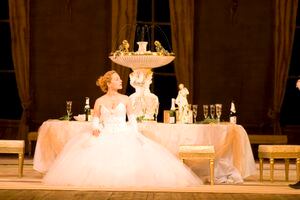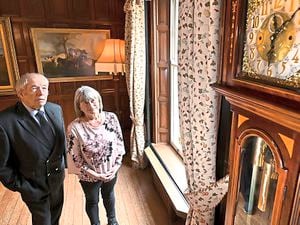La Traviata, Opera and Ballet International, Wolverhampton Grand Theatre - review
Gerald Smith reviews Verdi's iconic opera at Wolverhampton Grand.

Considering that, according to some sources, Traviata is the most popular opera on the planet, it has achieved this status despite a disastrous opening night.
Composer Verdi had been working to the point of exhaustion on two operas for Rome and came later than was intended to the Fenice opera house in Venice. He was displeased with the casting and the rehearsals had not gone well. The Venetian authorities also decided that the opera should not be done in modern dress, as Verdi wanted, because the subject matter was too scandalous.
The opening started well enough. However, Varesi put minimum effort into his part as Papa Germont and tenor Lodvico Graziani was incompetent as Alfredo. Worse still, the lead soprano, Fanny Salvini-Donatelli, was both fat and elderly – not what Verdi had intended for the role of consumptive heroine. Unsurprisingly her performance drew laughs and jeers.
Verdi confided in a friend that the opening had been a failure. “Was it my fault or the musicians? Time will tell.”
Recast, properly rehearsed and with a few alterations Traviata re-opened a year later and this time created a furore rather than a fiasco and went on to become the worldwide favourite it is today.
It is based on a true story which reflects the relationship between Alexandre Dumas junior and the Parisian courtesan Marie Duplessis, the toast of Parisian social life but who died aged just 23 from consumption.
This production comes from Opera and Ballet International and has been directed by the company’s chief executive officer Ellen Kent. She also related in great detail to me, over the course of the evening, the trials and tribulations of taking an opera company on a four-month national tour in the weather conditions we have experienced recently, not knowing whether or not an audience will turn up or even if they would be able to transport singers, orchestra, stage crew and support staff to their next destination.
This production has much to commend it. It is basically a no-frills traditional style which means that there are few distractions, allowing the drama to unfold naturally and with clarity.
As Violetta, Alyona Kistenyova is a complete joy, with her voice both colourful and articulate throughout her entire range and always fully under control. The only thing missing was a hint of the consumptive disease which would claim her life at a tragically young age.
Vitali Liskovetskyi brings a light, yet mellow, tenor voice to the role of Alfredo and shows considerable potential, while baritone Lurie Gisca makes a suitably authoritarian figure as Alfredo’s father Georgio Germont.
The chorus is charmingly youthful, if a little light, and the Orchestra of the National Ukrainian Opera, under conductor Vasyl Vasylenko, gave a very upbeat version of some of Verdi’s most glorious melodies, including the great drinking song from Act 1 “Libiamo” and Violetta’s plea for independence “Sempre Libere”. The conductor was careful, though, to reflect the emotional turmoil taking place on stage, with the accompaniment always well-balanced with the voices.
Tonight the company performs Puccini’s Madama Butterfly.





